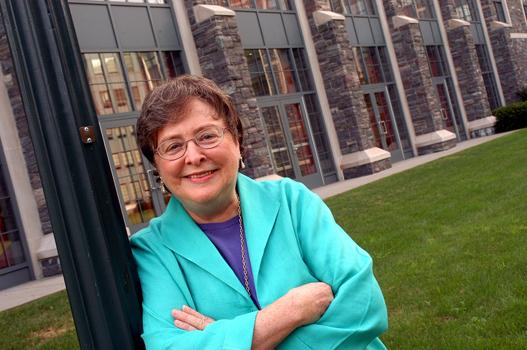Bishops Criticize Theology Professor’s Book
July 13, 2011

Published: April 13, 2011
A Fordham theologian’s book “contains misrepresentations, ambiguities and errors that bear upon the faith of the Catholic Church,” according to a recent statement by a United States Bishops committee. Elizabeth Johnson, C.S.J., distinguished professor of theology at Fordham University, was lauded as a serious theologian and “revered member of the Fordham Community” in a responding statement by Fordham University President, Rev. Joseph McShane, S.J.
Johnson’s 2007 book, “Quest for the Living God: Mapping Frontiers in the Theology of God,” draws conclusions that are “theologically unacceptable,” says the statement from the United States Conference of Catholic Bishops’ Committee on Doctrine. The statement says the book “does not take the faith of the Church as its starting point.”
Donald Cardinal Wuerl, chairman for the Committee on Doctrine, says concern exists because the book “is not directed to professional theologians for theological speculation, but rather is used as a teaching instrument for undergraduate students.” The book is for sale in Fordham’s bookstore as a text for core course “Faith and Critical Reason.”
Johnson, who is also author of books “She Who Is: The Mystery of God in Feminist Theological Discourse” and “Truly Our Sister: A Theology of Mary in the Communion of Saints,” released a statement saying that she was not invited to dialogue with the bishops. “One result of this absence of dialogue is that…this statement radically misinterprets what I think, and what I in fact wrote.” She claims that the bishops misrepresent “the fundamental line of thought the book develops.”
The Committee challenges what it says is Johnson’s assertion “that the Church’s names for God are metaphors…that consequently can be replaced by human ingenuity.” According to the Committee, Johnson also claims that “the Spirit of God is at work in other religions in the same manner that the Spirit is working within Christianity and thus other religions are equally salvific.” According to Johnson’s statement, “the book itself endeavors to present new insights about God arising from people living out their Catholic faith in different cultures around the world.”
“Professor Johnson is essentially saying, ‘OK, here we are in the 21st century; what are different groups of people doing in their reflecting about who God is?’” said Jeannine Hill Fletcher, associate professor of theology. According to Fletcher, the bishops interpret Johnson’s findings as a statement of her own beliefs about God. “I think that it is one piece of what is not so fair about their treatment of the book.”
Fletcher suggests the bishops are worried that Johnson’s book is being received as Catholic teaching though it does not reflect their position. She attributes this to a disagreement about what the purpose of theology is. “They essentially want Catholic theology to be a reflection on the bible guided by the Church’s doctrinal statements.”
Rev. Joseph McShane, S.J., president of Fordham University, commented on the task of the theologian in his statement regarding the Committee’s document, saying that it is “to wrestle with the mystery of God and God’s action in the world.” McShane says that [Johnson] sees the Committee’s statement “as an invitation to dialogue…on the complexity that a serious theologian faces as she or he tries to explain God to the modern world.”
In the document’s opening remarks, Wuerl notes that Johnson could have sought an imprimatur—a confirmation of doctrinal accuracy—for the book. “By seeking an imprimatur,” he says, “the author has the opportunity to engage in dialogue with the bishop concerning the Catholic teaching expressed in the book.”
“To me it would make no sense for this book to try and receive an imprimatur,” said Fletcher. “I think that [Johnson] did write it as a Catholic theologian, but I don’t think she wrote it as a statement of the doctrinal position of the Church.”
The Committee’s statement, which inspired a Fordham faculty petition to the USCCB to “take steps to rectify the lack of respect and consideration [in the document],” has been received with concern.
“I think that what the statement does is provide a bit of a reality check as to where the institutional Church actually is,” Fletcher said. “My greatest hope would be that the future of the Church would embrace…theologies that are thinking from the perspective of marginalized voices…I can’t imagine a Church that refuses these voices, and that’s what is so troubling about this.”
“I experience the bishops’ statement as attempting to control the mystery of God,” continued Fletcher. “I don’t want to disrespect the bishops in their desire to say that we have something in the tradition that we don’t want to lose sight of, but that sense of control makes me uneasy.”
On April 10, the Catholic Theological Society of America criticized the bishops’ statement, saying that the Committee breached protocols defined in its own 1983 document, “Doctrinal Responsibilities,” which states, “informal conversation ought to be the first step towards resolution [of theological misunderstandings].”
“I’d make the point that this was from the USCCB Committee on Doctrine only,” Charles Camosy, assistant professor of theology said. “This is not [Johnson’s] local bishop, this is not the president of the USCCB…and this certainly isn’t Rome.”
The Committee has not reacted to Johnson’s statement, in which she stated she would still wish to engage in dialogue.












